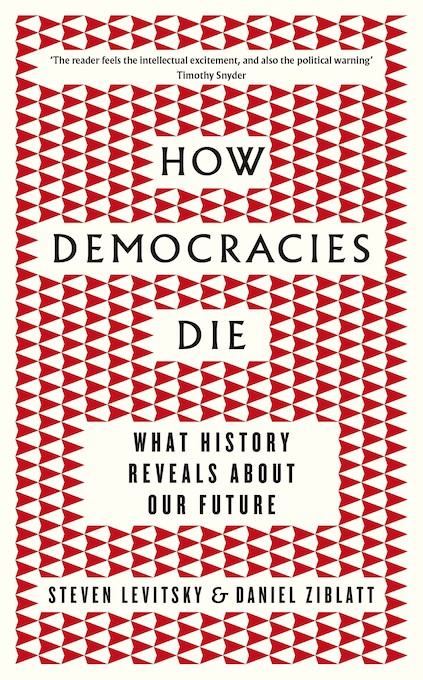How Democracies Die: What History Reveals About Our Future
Steven Levitsky and Daniel Ziblatt
2018

Liberal democracy has been questioned numerous times, promptingdesperate defence by its advocates like Francis Fukuyama, who infamously declared it the triumphant system – The End of History. But rarely has democracy, especially in America, come under so much threat than the target Trump’s presidency set on its back. Or so Steven Levitsky and Daniel Ziblatt would have us believe.
On the 20th January 2017, Donald Trump Jr. was inaugurated as the 45th president of the United States of America. Now the leader of the ‘free world’, the reality show figure went on to break heaps of laws, bent rules, ransacked positions, and creepily demanded loyalty. He carried these out in an unprecedented fashion, not even Richard Nixon – the Watergate president – was accused of so much crime during his term in the White House
In How Democracies Die: What History Reveals About our Future, the authors assess the state of American democracy and what it meant for the world and, more importantly, the country. It should be noted that their study was published during the Trump years. It was a crucial time in democracy’s history when its legitimacy and value were interrogated globally.
After the Obama years of continuous funding of dictators (like Abdel-Fatah al-Sisi in Egypt), the US supposedly got its very own dictator in Mr Trump. Perhaps it was the chicken coming home to roost? Was the US about to get the taste of its own medicine? The authors did not think so, provided true democracy was restored.
To achieve that, they believed Trump had to leave office, through elections or impeachment (yes, they suggested what the democrats eventually pursued and failed until they won the 2020 elections). Coursing through history and extending observation into other countries, they asserted that democracies die when dictators are at the helm. Their applicable definition of dictatorship manifests, they insisted, in intolerance to political opposition and lack of restraint in exercising power.
Hugo Chavez, the former late president of Venezuela was featured repeatedly to compare with Trump and depict how Chavez sentenced Venezuelan democracy to death. Essentially, showing how Trump could lead to a total collapse of America’s democracy and Manifest Destiny. They invented a litmus test consisting of four indicators to help detect individuals or entities with the potential to become dictators; rejecting democratic rules of the game, denying the legitimacy of the opposition, encouraging violence to achieve their selfish interests, and hampering liberties, including media. Trump fits all these criteria. But, they added, Trump is not all to blame but the slackening of what they call guardrails over the last decades contributed. Guardrails are supposedly unwritten rules that enable checks and balances that, along with the constitution, protect the strength of democracy.
The book’s arguments centre on historic instances where imposing leaders that abhor institutional straitjackets eventually led their nations to ruin. This, however, is a major misdirection to the real anecdote of America’s (and the world’s) ailments. The challenges Trump faced did not begin or even worsened during his term. They were already present when he came to office. Barack Obama, now celebrated as a hero, presided over one of the most damaging global economic crises, from which the world has still not recovered (as another crisis looms). Gun violence did not begin under Trump, rather just as it worsened under his comic administration, as it did under Obama compared to Bush’s. The whole architecture of democracy, to close observers, would seem to be a gravy train destined to derail.
Donald Trump, who is known as a notorious liar that engages in unorthodox business practices, is nothing more than a manifestation of the real American Dream. The crisis of America did not disappear after Trump. By all indications, they are ever present and exacerbating. While governments could always find ways of avoiding responsibility for their failures, like taking advantage of Covid, they cannot find viable excuses to extricate democracy from the intricacies of global political and economic crises it causes.
Whenever democracies fail and public distraction fails, the blame is quickly shifted to the system’s operators, namely presidents. And that is what Levitsky and Daniel Ziblatt did in How Democracies Die: What History Reveals About our Future. The book is yet another desperate but fickle defence of a moribund, precarious system.




